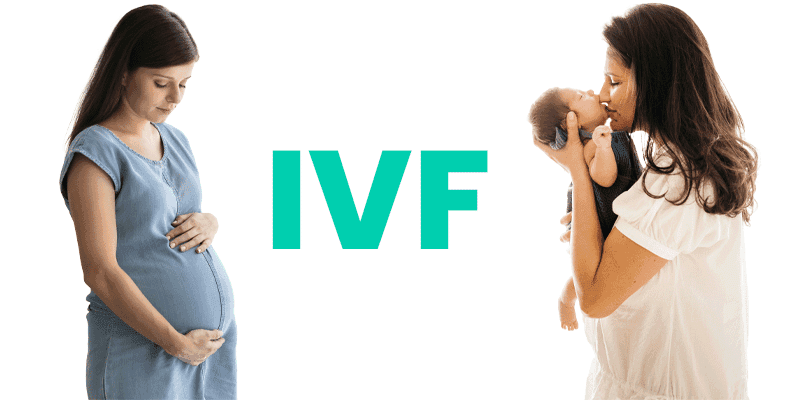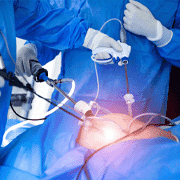Laparoscopy IVF Treatment - Everything You Should Know
In This Article
Laparoscopy IVF Treatment - Everything You Should Know
Sreemoyee
Updated on September 13, 2025
Medically verified by Dr. Arya
Fact checked by Dr. Sharon

Laparoscopic
8 min read
What is Laparoscopy IVF Treatment
Laparoscopy IVF Treatment combines two powerful techniques to increase your chances of conceiving. IVF involves fertilising eggs outside the body and then placing the embryo in the uterus. Laparoscopy, on the other hand, is a minimally invasive surgery using small incisions and a tiny camera to explore and treat reproductive issues.
Why Laparoscopy with IVF
Laparoscopy plays a vital role in preparing your body for a successful IVF journey. It helps identify and address factors that could affect fertility. Like blocked fallopian tubes, endometriosis, or fibroids. By resolving these issues before IVF, you're setting the stage for a smoother pregnancy journey.
The Benefits of Laparoscopy IVF
Precision: Laparoscopy offers a clear view of your reproductive organs. It allows surgeons to be precise in their procedures.
Quicker Recovery: Smaller incisions mean shorter healing time. You'll be up and running sooner than with traditional surgery.
Less Pain: Laparoscopy causes less discomfort compared to open surgery.
Reduced Scarring: Small incisions mean minimal scarring. So you won't have a constant reminder of the procedure.
The Laparoscopy IVF Process
Evaluation: We will connect you with the best surgeon. He/she will review your medical history. Necessary tests like ultrasounds or MRI might be conducted to understand your specific situation.
Anaesthesia: You'll receive general anaesthesia, ensuring you're comfortable throughout the procedure.
Small Incisions: Tiny incisions are made to introduce the laparoscope and other instruments.
Exploration and Treatment: The surgeon examines your reproductive organs, addressing any issues like cysts, fibroids, or adhesions.
IVF Procedure: Once any issues are resolved, the IVF process can begin. Eggs are retrieved, fertilised, and healthy embryos are transferred to the uterus.
Recovery: You'll spend a short time in recovery and can usually head home on the same day.
Preparing for Laparoscopy IVF
-
Consultation: Discuss your medical history and concerns with your doctor.
-
Testing: Ultrasound, MRI, and other tests help pinpoint issues.
-
Mental Prep: Keep positive vibes, and ask questions to ease your mind.
During the Procedure
-
Anaesthesia: You'll be comfortable and relaxed under general anaesthesia.
-
Small Incisions: Tiny cuts allow the surgeon to work with precision.
-
Exploration and Treatment: Surgeons fix issues like endometriosis or unblock tubes.
-
IVF Process: Once issues are resolved, IVF begins with egg retrieval and embryo transfer.
Recovery from Laparoscopy IVF
-
Same Day: Recovery's usually quick, and you can head home the same day.
-
Rest: Take it easy for a few days and follow your doctor's advice.
-
Back to Normal: You'll be back on your feet in no time, thanks to minimal incisions.
Recovery Tips from Doctors
-
Rest: Give your body time to heal, and avoid strenuous activities.
-
Hydration and Nutrition: Stay hydrated, and eat nutritious foods for better healing.
-
Follow-Up: Attend post-op appointments and keep your doctor in the loop.
Side effects of laparoscopic IVF
Pain and Discomfort: After the procedure, you might experience mild to moderate abdominal discomfort, shoulder pain, or bloating. This is usually temporary and can be managed with prescribed pain relievers.
Nausea and Vomiting: You might experience nausea or vomiting due to the effects of anaesthesia or the procedure itself. This typically subsides within a short time.
Fatigue: General anaesthesia and the surgical process can cause temporary fatigue. Rest and proper hydration can help alleviate this.
Swelling and Bruising: Minor swelling or bruising around the incision sites is common and should resolve over time.
Risk of Infection: As with any surgical procedure, there's a risk of infection at the incision sites. Proper care, including keeping the incisions clean and dry, can help reduce this risk.
Bleeding: Minimal bleeding is common at the incision sites. If you notice excessive bleeding or the appearance of bright red blood, contact your healthcare provider.
Risks:
Anaesthesia Risks: Anesthesia can cause allergic reactions, breathing difficulties, or adverse effects on certain individuals.
Injury to Surrounding Organs: While rare, there's a small risk of accidental damage to nearby organs. Or blood vessels during the laparoscopic procedure.
Infection: Infection can occur at the incision sites or within the abdominal cavity. This risk is minimised with proper surgical techniques and post-operative care.
Adverse Reaction to Medications: Medications used during and after the procedure can sometimes lead to allergic reactions or other adverse effects.
Ectopic Pregnancy: Laparoscopy IVF aims to address fertility issues. But there's still a chance of ectopic pregnancy during subsequent IVF treatment.
Blood Clots: Prolonged periods of inactivity during recovery can increase the risk of blood clots in the legs or lungs.
How safe is laparoscopic IVF and what precautions are taken by doctors
Laparoscopy IVF is generally safe, but precautions matter.
Expertise: Ensure your surgeon is skilled in both laparoscopy and IVF techniques. Mykare Health takes care of this for you.
Facility: Go to a well-equipped facility with experienced staff. We will arrange for the leading facilities that boast of efficient staff and the best of doctors.
Follow Doctor's Orders: Post-op care is crucial, so stick to your doctor's advice.
Laparoscopy IVF vs Traditional Methods
| Aspect | Laparoscopy IVF | Traditional Method |
|---|---|---|
| Incisions | Small, minimal scarring | Larger incisions, scarring |
| Recovery Time | Faster recovery | Longer recovery |
| Pain | Less discomfort | More postoperative pain |
| Anaesthesia | General anaesthesia | General anaesthesia |
| Precision | High | Moderate |
| Exploration & Treatment | Visualised & treated | Limited visualisation |
| Fertility Issues Treated | Endometriosis, Blocked Tubes, Fibroids | Limited options |
| Facility & Expertise | Requires skilled surgeons and equipped facilities | Standard surgical setting |
| Post-Operative Care | Usually minimal complications | Potential for more complications |
| Success Rates | Improved due to precise treatment | Standard success rates |
| Scarring | Minimal scarring | Noticeable scarring |
| Post-Operative Pain | Reduced | Increased |
| Hospital Stay | Shorter | Longer |
| Anesthesia Duration | Shorter | Longer |
| Risk of Infection | Lower | Moderate |
Remember that the choice between Laparoscopy IVF and the traditional method depends on certain factors. Like, your specific medical situation, preferences, and the recommendations of your healthcare provider. Our expert doctors will help you make the right choice.
 9 min read
9 min readTop 9 Things To Know About Laparoscopic Treatment for Pregnancy
 9 min read
9 min readHow Much Does Laparoscopy Treatment Cost? Here's The Truth
 8 min read
8 min readTreatment After Laparoscopy for Pregnancy - What You Need to Know
Get a Callback Now
Is Laparoscopy IVF for You
Laparoscopy IVF is recommended if you have fertility concerns that might impact the success of IVF. Conditions like endometriosis, blocked fallopian tubes, or ovarian cysts can benefit from this combined approach.
Conditions Treated by Laparoscopy IVF
Here are some of the conditions that can be treated with Laparoscopy IVF.
Endometriosis: This condition occurs when tissue similar to the lining of the uterus grows outside the uterus. Laparoscopy can identify and remove endometriosis patches, improving fertility.
Blocked Fallopian Tubes: Blocked tubes can prevent eggs from reaching the uterus. Laparoscopy can help open or repair the tubes. It also enhances the chances of natural conception or successful IVF.
Ovarian Cysts: Cysts can hinder conception and pregnancy. Laparoscopy can remove cysts and restore ovarian health.
Fibroids: These non-cancerous growths in the uterus can affect implantation. Laparoscopy can remove fibroids while preserving the uterus. It also improves the odds of a successful pregnancy.
Polycystic Ovary Syndrome (PCOS): Laparoscopy can be used to perform ovarian drilling. It is a procedure that helps stimulate ovulation in women with PCOS.
Adhesions and Scarring: Laparoscopy can address adhesions or scar tissue in the pelvis. These can hinder fertility by affecting organ mobility.
Ectopic Pregnancy: In some cases, an ectopic pregnancy might require laparoscopic intervention. Ectopic pregnancy occurs when the embryo implants outside the uterus.
Unexplained Infertility: At times, the cause of infertility is not clear. Laparoscopy can help identify any underlying issues that might be hindering conception.
Determining if Laparoscopy IVF is Right for You
Deciding if Laparoscopy IVF is the right option involves several factors. And it's best to consult with your healthcare provider. Here are the determinants to consider:
Medical History: Your medical history, including any previous surgeries, conditions, and fertility challenges, will influence whether Laparoscopy IVF is suitable.
Underlying Issues: Do you have conditions like endometriosis, blocked tubes, or fibroids that could impact fertility? In all these cases, your doctor may recommend Laparoscopy IVF.
Age: Age plays a significant role in fertility. If you're older, addressing any underlying issues with Laparoscopy IVF can improve your chances of successful IVF.
IVF Success Rate: Depending on your specific situation, your doctor might recommend Laparoscopy IVF. To increase the chances of a successful IVF outcome.
Expertise: Consult with fertility specialists who are experienced in both laparoscopic procedures and IVF. Mykare Health has a dependable network of such specialists. Their assessment and recommendation are crucial.
Personal Preferences: Consider your preferences, comfort level with medical procedures. And willingness to go through surgery as part of your fertility journey.
Cost and Resources: Assess the financial implications and availability of resources for Laparoscopy IVF. It's essential to have a comprehensive understanding of the entire process. Mykare Health takes care of this aspect as well.
Remember, each individual's fertility journey is unique. Consulting with your healthcare provider and fertility experts to determine if Laparoscopy IVF is the right path for you. Based on your specific medical history, conditions, and goals. Mykare Health’s expert doctors will make your journey towards parenthood seamless.
Laparoscopy IVF brings precision, faster recovery, and hope to your fertility journey. Consult your healthcare provider to explore if this powerful combo is right for you. Your path to parenthood is full of possibilities!
Laparoscopy IVF combines IVF and laparoscopy, addressing fertility issues with precision.
IVF fertilises eggs externally and transfers embryos to the uterus.
Laparoscopy involves minimally invasive surgery for fertility-related problems.
Laparoscopy identifies and treats factors affecting fertility like blocked tubes, fibroids, and endometriosis.
It paves the way for a smoother IVF journey by resolving these issues in advance.
Precision: Laparoscopy offers clear views for precise treatment of reproductive organs.
Quicker Recovery: Smaller incisions lead to faster healing compared to traditional methods.
Less Pain: Laparoscopy causes less discomfort during recovery.
Reduced Scarring: Tiny incisions result in minimal scarring.
Evaluation: Surgeons review your history and conduct tests to understand your situation.
Anaesthesia: General anaesthesia ensures your comfort during the procedure.
Small Incisions: Tiny cuts introduce instruments for treatment.
Exploration and Treatment: Surgeons address issues like cysts, fibroids, or adhesions.
IVF Process: After resolving issues, IVF starts with egg retrieval and embryo transfer.
Same Day Recovery: Quick healing lets you head home on the same day.
Return to Normal: Minimal incisions facilitate a speedy return to daily activities.
Expertise: Skilled surgeons in both laparoscopy and IVF techniques are essential.
Facility: Choose well-equipped facilities with experienced staff for your procedure.
Doctor's Advice: Follow post-op care instructions for optimal recovery.
Consider Medical History: Previous surgeries, conditions, and fertility challenges play a role.
Address Underlying Issues: If you have conditions like endometriosis or blocked tubes, a doctor can recommend Laparoscopy IVF.
Age and Success Rate: Age affects fertility. Laparoscopy IVF can improve chances for older individuals.
Expertise and Preferences: Consult specialists experienced in both techniques and consider your personal preferences.
Financial Implications: Assess costs and resources involved in the process.
There are a couple of risks and side effects of laparoscopy IVF, just like any other procedures. But, the advantages outweigh the risks.
Source Links
MedicalNewsToday
HEALTH UNIVERSITY OF UTAH



